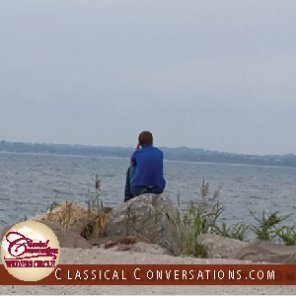As a Challenge III tutor, I have the pleasure of studying poetry with my students. Every week I read aloud a poem connected to their U. S. History reading assignment. As we study Cicero’s speeches in second semester Latin, we encounter many rhetorical devices there also. We become familiar with the very same schemes and tropes that are the language of poetry. The poetry I read to the class catches on many memory pegs.
When tutoring Challenge III two years ago, I noticed that the study of Latin informed our study of poetry, and that the poetry gave us insight in our history study. At the end of the year, I assessed the understanding of my students through a Blue Book exam, and included a new poem for their response. I asked them to write everything they observed in “The Trouble with Poetry” by Billy Collins.
“The Trouble with Poetry”
The trouble with poetry, I realized
as I walked along a beach one night —
cold Florida sand under my bare feet,
a show of stars in the sky —
the trouble with poetry is
that it encourages the writing of more poetry,
more guppies crowding the fish tank,
more baby rabbits
hopping out of their mothers into the dewy grass.
And how will it ever end?
unless the day finally arrives
when we have compared everything in the world
to everything else in the world,
and there is nothing left to do
but quietly close our notebooks
and sit with our hands folded on our desks.
Poetry fills me with joy
and I rise like a feather in the wind.
Poetry fills me with sorrow
and I sink like a chain flung from a bridge.
But mostly poetry fills me
with the urge to write poetry,
to sit in the dark and wait for a little flame
to appear at the tip of my pencil.
And along with that, the longing to steal,
to break into the poems of others
with a flashlight and a ski mask.
And what an unmerry band of thieves we are,
cut-purses, common shoplifters,
I thought to myself
as a cold wave swirled around my feet
and the lighthouse moved its megaphone over the sea,
which is an image I stole directly
from Lawrence Ferlinghetti —
to be perfectly honest for a moment —
the bicycling poet of San Francisco
whose little amusement park of a book
I carried in a side pocket of my uniform
up and down the treacherous halls of high school.
I love the shore. I grew up on a coastal town on Long Island Sound and I miss the view. Where land meets sea and sea meets sky, thoughts escape from a cage of clutter and spread their wings. There on the shore, the author of the poem is irritated, as an oyster is with a grain of sand, and he works it and works it until he has transformed it into a pearl. “The trouble with poetry…” he begins. His surroundings take his attention for a moment, but he returns to the niggling thought. He finally spits out in amused exasperation that poetry begets more poetry.
Why is this a problem?
With poetry one can never rest and be done. Good poetry inspires a response. The reader feels compelled to roll up his sleeves and knead a loaf of bread, lay row of stones, or cook a gourmet meal. Art calls for art. Beauty’s effect is to create a restless desire for beauty.
“And how will it ever end?” he asks, as though property taxes have gone up yet again, or his friend pleads for another loan that will not be repaid. He engages in hyperbole, imaging a day when everything has been compared to everything else, when all our insights about the world have already been aptly explained by a perfect metaphor and there is nothing else to contribute. He illustrates with the good student’s pose of repose: sitting with hands folded on our desks because we have done everything there is to be done. This good-girl posture is in contrast to the messy begetting of poetry, the cold wave swirling at the feet, the bouncing bunnies, the random guppies, and the breaking in to steal from others.
“And how will it ever end?” It is the question you ask when you are dangerously addicted to a behavior that will eventually give you grief. He utters this in deadpan concern and it makes me smile. All right, so his writing and reading of poetry leads him to more writing and more reading, links of a chain that has no end. If that is his burden, it is also his delight. You cannot tell me the author is burdened by the power his pencil has to ignite into the fire of insight.
A poem incarnates insight in metaphors and similes, and if a writer “steals” an idea, it is the theft that shows up at a potluck as an original stew faintly reminiscent of a dish once offered by the best cook in the neighborhood.
In the end (or the beginning), poetry for him was a place of delight and safety as he moved “up and down the treacherous halls of high school.” Not only does poetry create in him desire to write, but this writing is his salvation. It is his secret weapon against the war for his soul. As he moved among the half-formed persons of his high school, he carried next to his heart the wisdom of the poets.
Poetry reminds us that we are so much more than a human-doing of homework or chores, or than an impotent consumer of the news, for it engages us outside of linear, rational thinking in the expansive part of us that experiences the whole. It is the distinction between analytic, scientific knowledge and poetic knowledge. It is the difference between a reasoned argument for taking a vacation and the experience of profound rest we get when we spend a week by the sea.
Poems are to our souls what ten glasses of water are to our bodies; they plump us and wash away the toxins of our stressful lives. We neglect them and miss so much.
Read poetry. Then, if you dare, scratch your pencil across paper and strike a flame.
Note:
If poetry is a smoky glass for you or your students, start with another poem by Billy Collins, “Introduction to Poetry.” He suggests we contemplate the images, listen to the sounds, pause in the spaces, and not be intimidated by a hovering author. Tania Runyun has written a fantastic little book about that poem in order to teach us how to enjoy poetry: How to Read a Poem.




